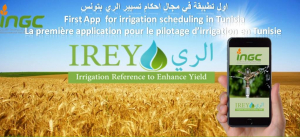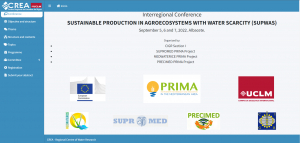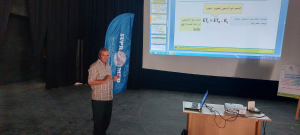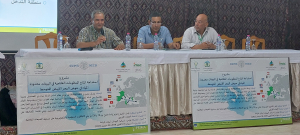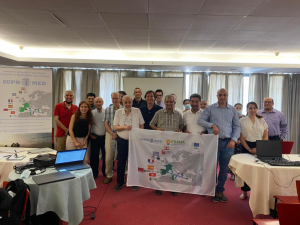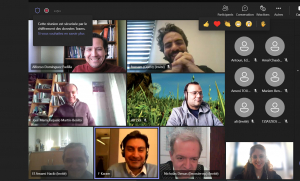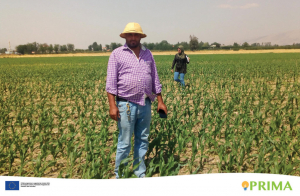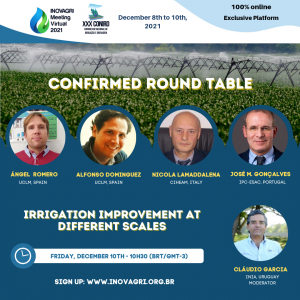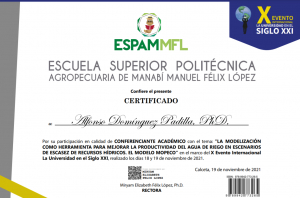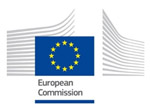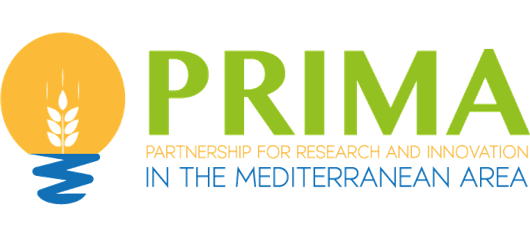Dedicated to cereal growers, this application allows farmers to register for an online platform and thereby receive personalized notifications and recommendations concerning irrigation periods and the quantities required.
The first version of this application was launched by the INGC in 2015, where 100 farmers and technicians signed up from the first days after the launch. When registering, the farmer provides information regarding the location of his plots, the nature of the soil, the date of sowing, and the type of cereals.
The application is a decision support tool that calculates the water balance per plot and suggests a tailor-made irrigation schedule to the farmer. This calendar helps the farmer to optimize his productivity, reduce the costs associated with irrigation and, ultimately, improve his income. The INGC are counting on this application to reach 8 000 irrigated grain farmers.
The IREY application is part of SUPROMED PLATFORM : https://dss.supromed.eu/portal/
The Conference aims to be a forum for meeting and reflection between farmers, technicians and researchers, within the process of demonstration and transfer of research results to the productive sector under the scenario of decreasing water availability and increasing energy costs. Thus, contributing to the social, economic, and environmental sustainability of water and energy use in agroecosystems located in arid and semi-arid areas to cope with climate change.
The Conference will be held simultaneously face-to-face and online on September 5, 6 and 7, 2022 in Albacete, Spain. Simultaneous translation will be used in English- Spanish by Zoom, and with subtitles in French, Italian, Portuguese… by Teams, to achieve greater participation in the dissemination and transfer of research results.
Venue: University of Castilla-La Mancha, Campus Universitario, General Services Building, Albacete, Spain.
◊ In order to encourage as many participants as possible to attend the Interregional Conference, no registration fee is required, but in order to attend face-to-face or online, registration is mandatory.◊
Registration available here: https://crea.uclm.es/crea/SUPWASConference/inscripcion
The full conference program is available here
For more information visit the event dedicated website: https://crea.uclm.es/crea/SUPWASConference
9 engineers and technicians participated at the training on the use of the "FielClimate" application for monitoring weather data and soil moisture organized in the framework of SUPROMED project on 23 June 2022 in Tunisia.
The participants appreciated the usefulness of sensors and weather stations in irrigation scheduling based on real local data. They also expressed interest in increasing the number of plots equipped with moisture sensors and weather stations.
43 participants attended the workshop held in Gafsa Tunisia on 6-7 June 2022. The participants were farmers, engineers, researchers and policymakers.
Interesting discussions took place on the following topics :
- Management of common resources under the open-access regime.
- The state of groundwater in the regions of Sidi bouzid , Gafsa, and Kasserine
- Good agricultural practices in the management of olive trees, almond trees and pistachio trees.
- Presentation of the technological platform of the SUPROMED project.
- Presentation of the MOPECO model with application on a concrete case.
- Presentation of the IREY model with application.
- Testimonies of users farmers
- General discussion on the usefulness of irrigation scheduling tools based on local weather data and rainfall forecasts.
- Feedback and attitudes of farmers and technicians regarding the usefulness of the tools and willingness to pay for these services.
Given the critical state of the groundwater, which is largely overexploited in the 3 Governorates (Sidi Bouzid, Gafsa, Kasserine), two major suggestions emerged from the discussions:
- The first is the need (or even the obligation) to introduce fundamental changes in the production systems by gradually reducing the highly water-intensive crops (industrial tomatoes and lettuce, as is the case in Sidi Aïch-Gafsa) in favour of wheat and winter fodder crops for greater integration of livestock. But this change of allocation requires a real involvement of the decision-makers in order to considerably increase the prices of cereals (the depletion of the aquifers is largely due to the unequal ratio of prices, largely to the benefit of market gardening and fruit trees).
- The second is to better disseminate decision support model solutions and to increase the number of plots equipped with humidity sensors and weather stations.
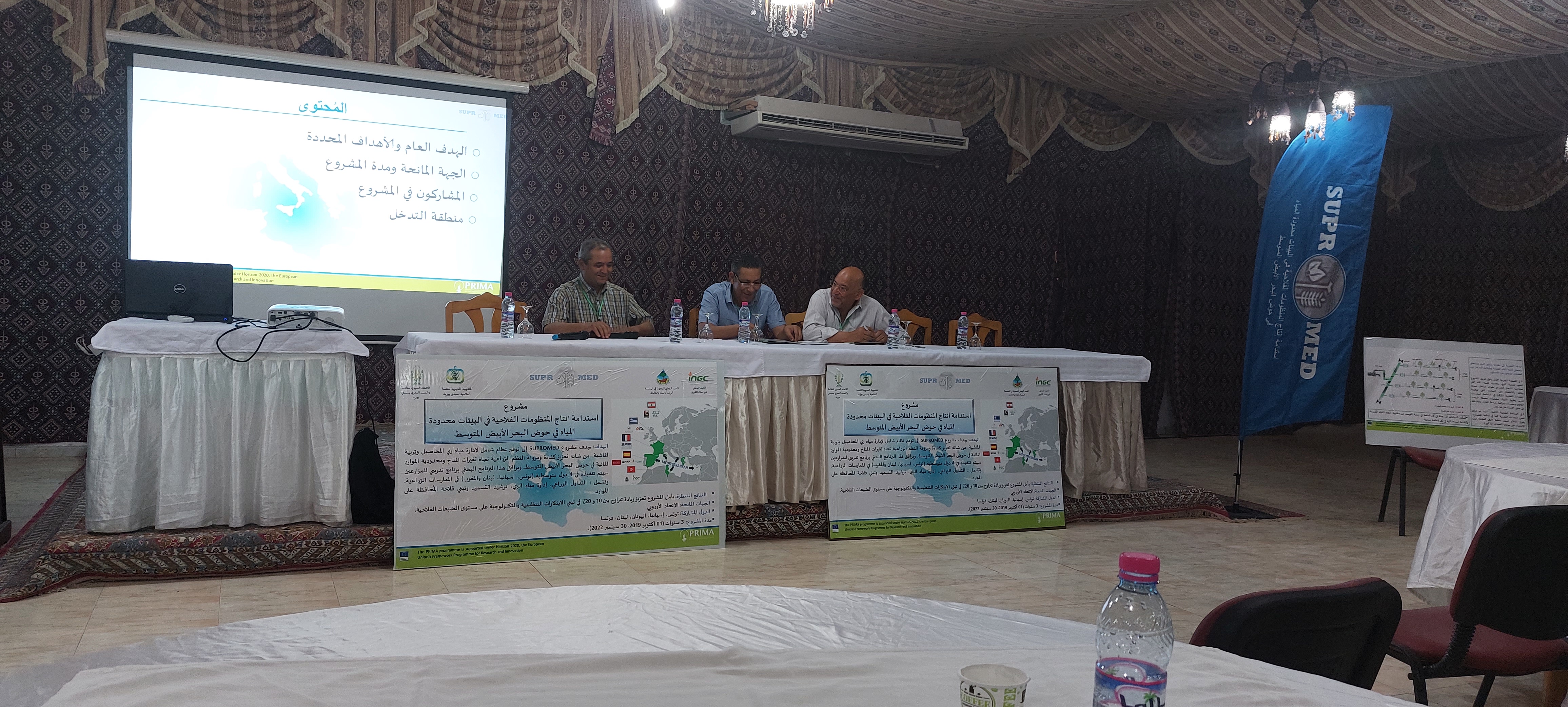
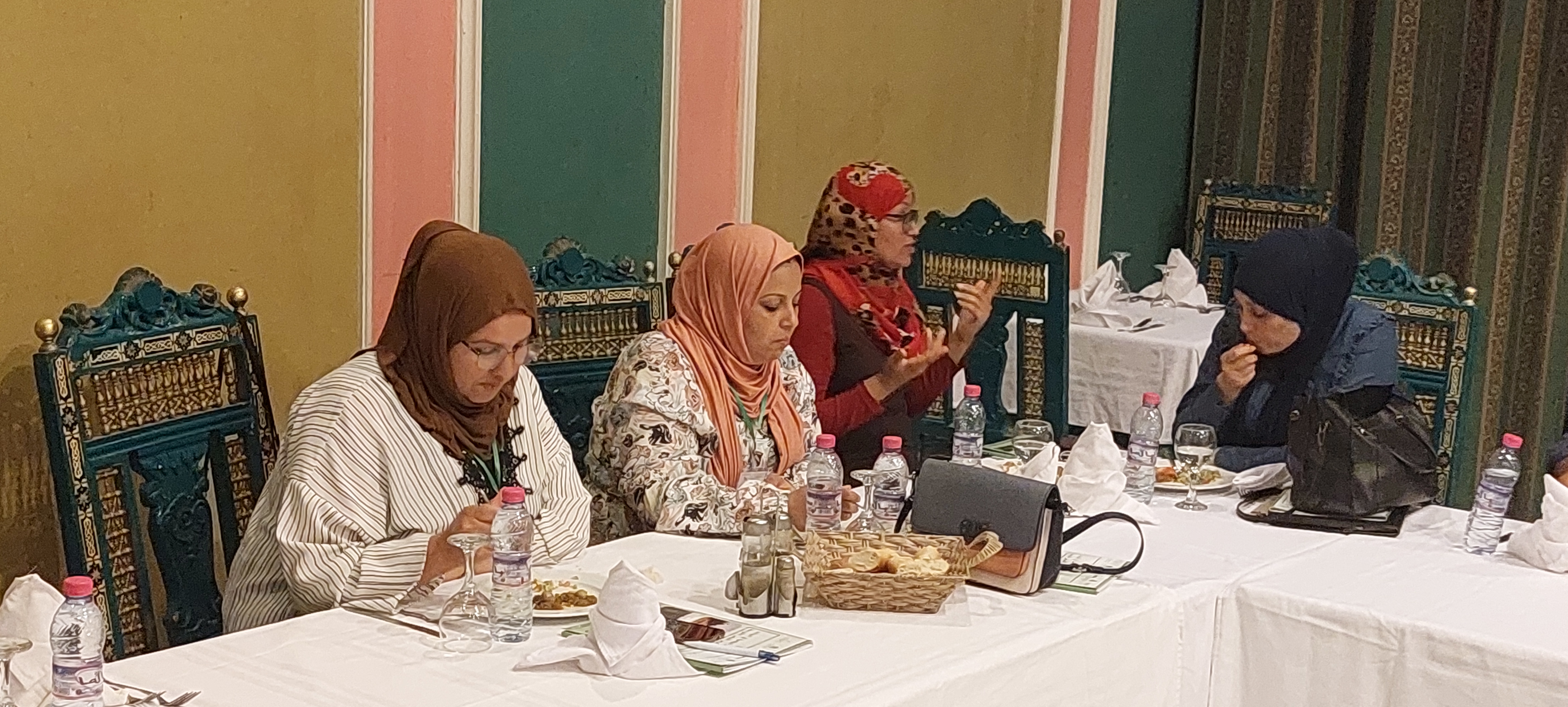
From 29 June to 2 July, the SUPROMED team had fruitful meetings in Volos Greece.
On 29 June a coordination meeting was held with the participation of the 10 partners of the SUPROMED project. Partners discussed the prepared activities and reports and established a plan for the next period.
From 30 to 1 July SUPROMED partners participated in Agroecoinfo symposium 2022 organized by the SUPROMED partner university of Thessaly. One special session was dedicated to SUPROMED results during the symposium.
On the 2nd of July, a training session addressed to Greek farmers and technicians on methodologies and tools used in SUPROMED and HubIS projects was organized. This training session was held in English and Greek languages by the corresponding scientists, who have developed these methodologies and tools ( MOPECO, FabLabs, Irrigation models etc.) and translated into Greek by the UTH research team participating in the two PRIMA projects.
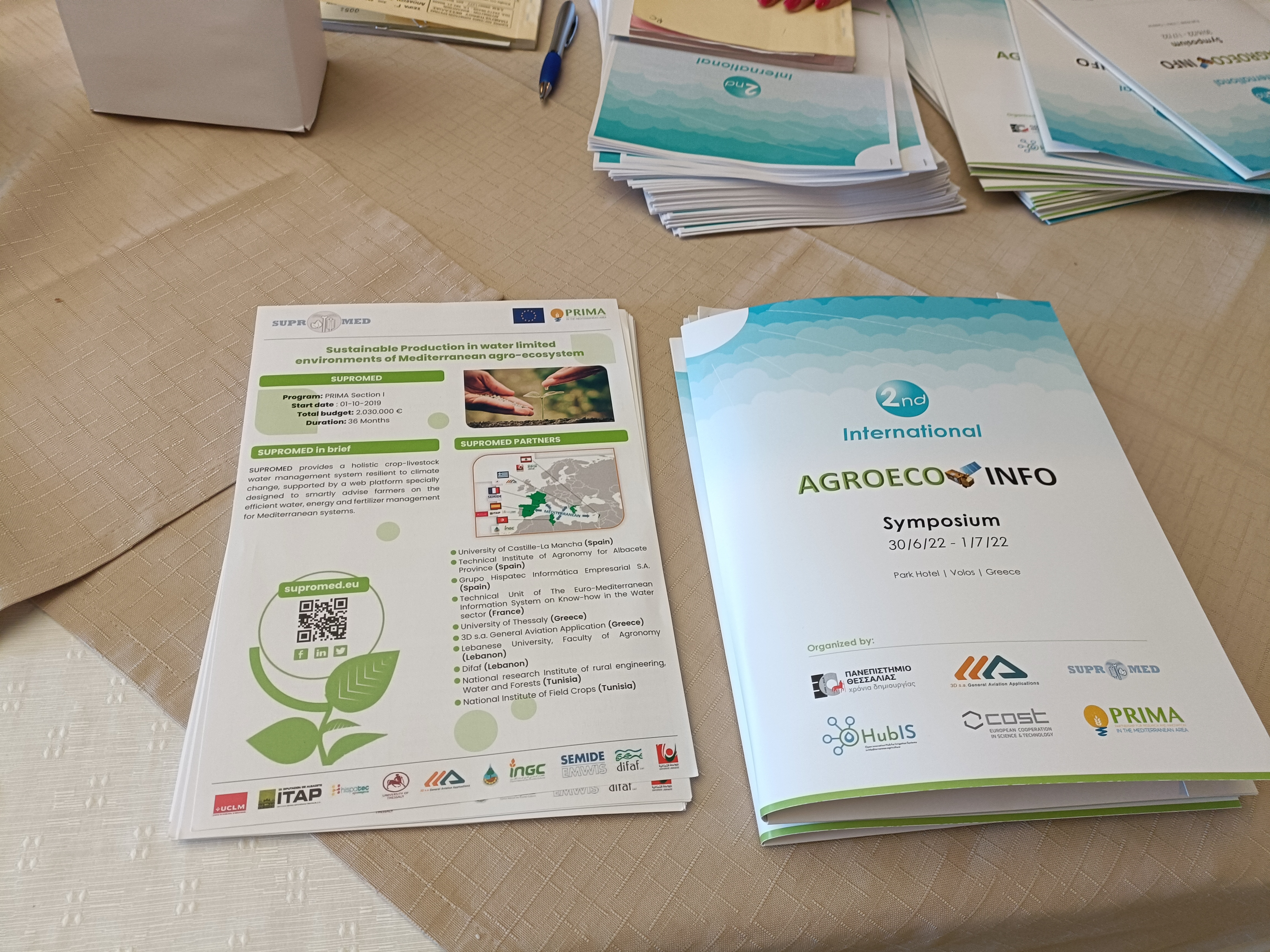
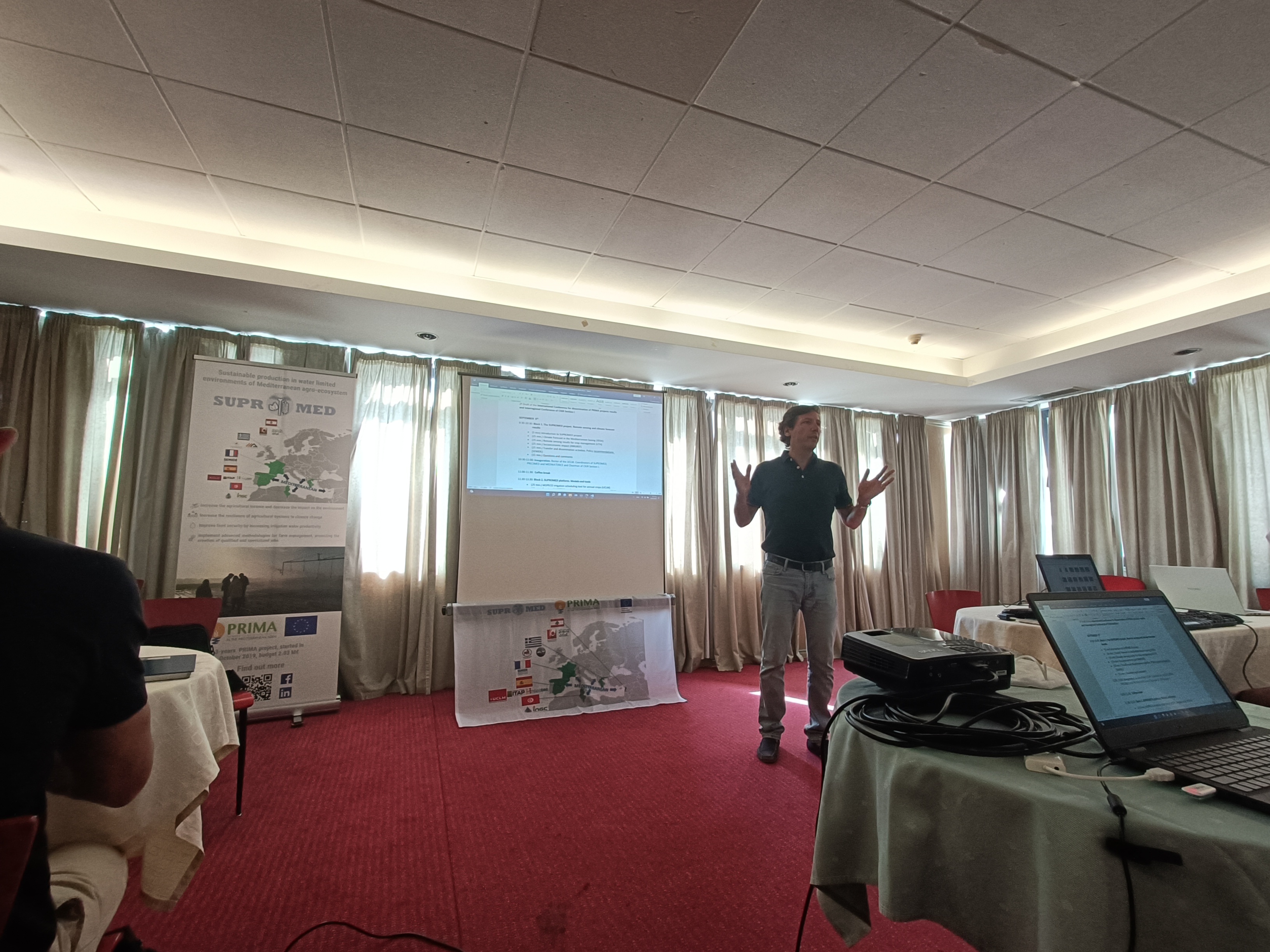
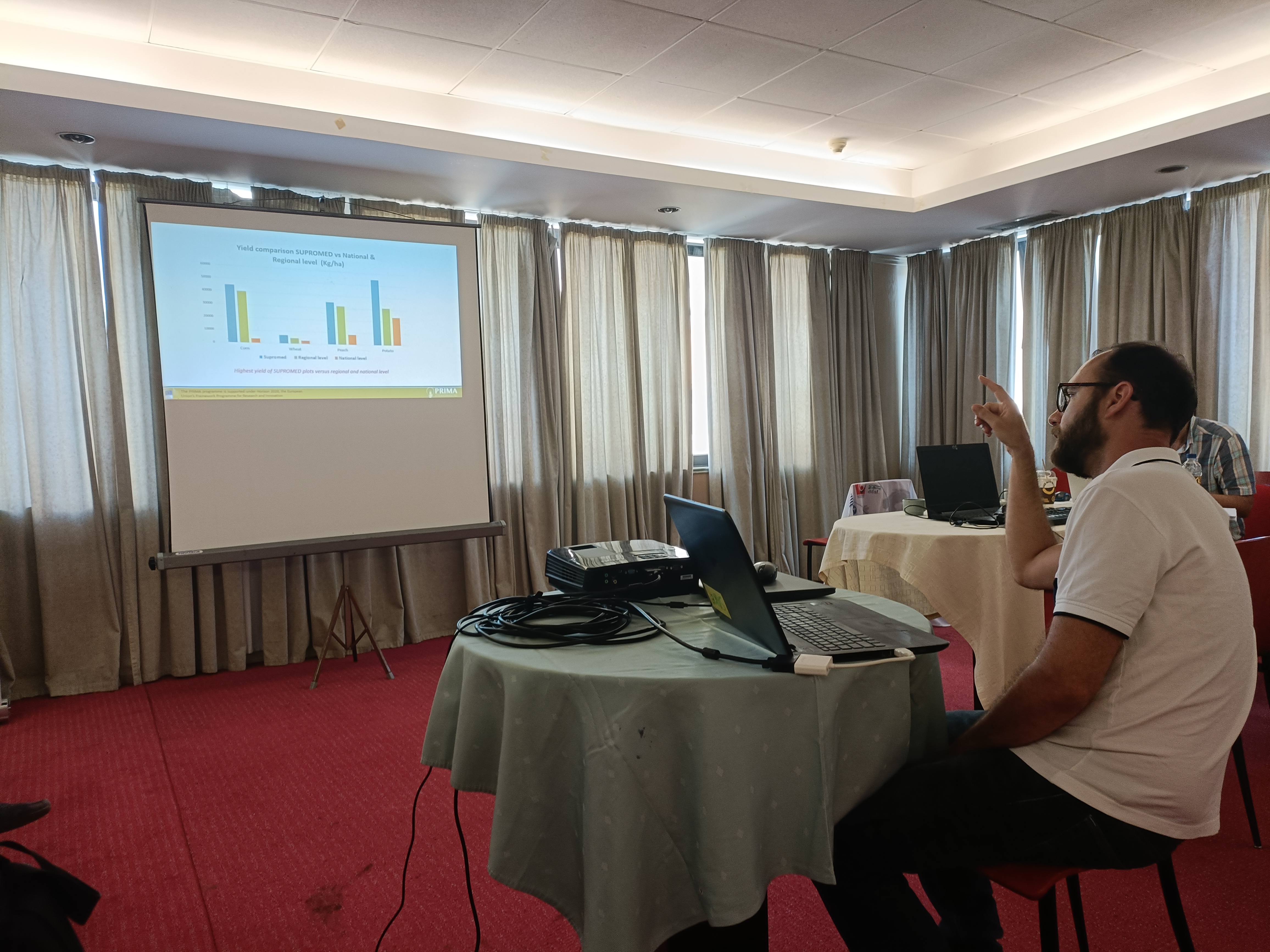
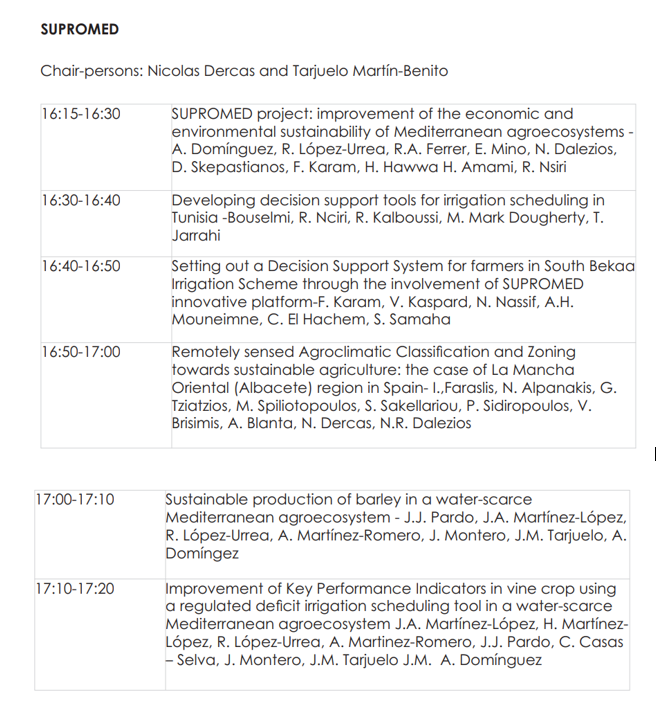
SUPROMED 3rd Technical Meeting was successfully concluded on Thursday, 07 April 2022. SUPROMED project partners presented the results of the project and discussed the next steps before the end of the project.
Partners have also discussed the two SUPROMED workshops to be held respectively in June and September :
and
On 22 March 2022, on the occasion of world water day, Prima Program published an article about SUPROMED project.
Finding solutions through research
How can we adapt to and mitigate the effects of droughts? PRIMA works on different lines of action to meet this challenge. On the one hand, it is necessary to preserve the soil, which suffers from an advanced state of erosion in the Mediterranean. Some of the PRIMA funded projects, such as CAMA, work on this line of action by trying to reduce the risk of soil quality degradation. One of the critical factors of conservation agriculture is a cropping system that covers the soil surface with crop residues to avoid humidity evaporation.
On the other hand, it is also essential to develop sustainable farming practices to tackle the drought problem, considering that almost 75% of fresh water is used for agricultural purposes. A more resilient approach is needed, reducing or adapting water resources.
Here it comes SUPROMED (Sustainable Production in Water Limited Environments of Mediterranean Agro-ecosystem), an R&I project co-funded by PRIMA, which aims to enhance Mediterranean farming systems’ economic and environmental sustainability through more efficient management of water, energy and fertilisers. Partnering with ten organisations from Spain, France, Greece, Lebanon and Tunisia, the project will provide a holistic water management system resilient to climate change. In detail, what is going to be delivered is an end-user technology platform specially designed to smartly advise farmers in the efficient water management of Mediterranean cropping.
Read the full article here: https://prima-med.org/drought-the-silent-enemy-of-the-mediterranean/
On 22 March 2022, on the occasion of world water day, Prima Program published an article about SUPROMED project.
How can we adapt to and mitigate the effects of droughts?
PRIMA works on different lines of action to meet this challenge. On the one hand, it is necessary to preserve the soil, which suffers from an advanced state of erosion in the Mediterranean. Some of the PRIMA funded projects, such as CAMA, work on this line of action by trying to reduce the risk of soil quality degradation. One of the critical factors of conservation agriculture is a cropping system that covers the soil surface with crop residues to avoid humidity evaporation.
On the other hand, it is also essential to develop sustainable farming practices to tackle the drought problem, considering that almost 75% of fresh water is used for agricultural purposes. A more resilient approach is needed, reducing or adapting water resources.
Here it comes SUPROMED (Sustainable Production in Water Limited Environments of Mediterranean Agro-ecosystem), an R&I project co-funded by PRIMA, which aims to enhance Mediterranean farming systems’ economic and environmental sustainability through more efficient management of water, energy and fertilisers. Partnering with ten organisations from Spain, France, Greece, Lebanon and Tunisia, the project will provide a holistic water management system resilient to climate change. In detail, what is going to be delivered is an end-user technology platform specially designed to smartly advise farmers in the efficient water management of Mediterranean cropping.
Read the full article here: https://prima-med.org/drought-the-silent-enemy-of-the-mediterranean/
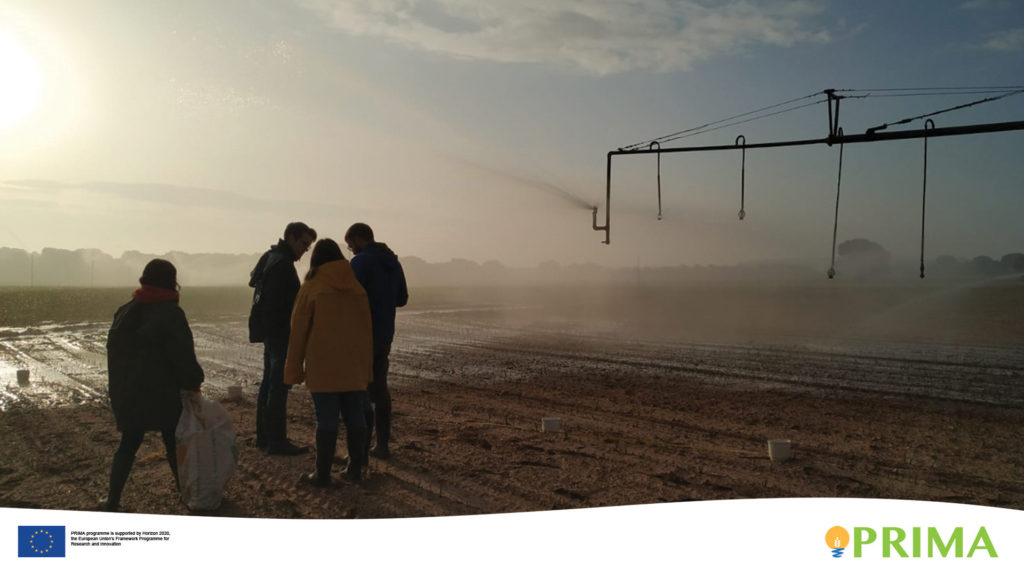
On January 8 2007, the INOVAGRI Institute was founded in a meeting at the headquarters of the Association of Agricultural Engineers of the State of Ceará. Ten professionals decided to create this association of specialists in the rational use of water in agriculture. Since then, throughout these thirteen years INOVAGRI has been carrying out many activities that have been contributing to bring to irrigated fields all over Brazil, a new perspective for research, technological development and innovation in irrigated agriculture.
INOVAGRI contributes in a systematic and active way to the development of irrigated agriculture and the rational use of water through the execution of basic or applied research, technological development and innovation, as a way of fighting water scarcity, negative environmental impact and social inequality and poverty in the fields of Brazil.
INOVAGRI operates mainly with the production, diffusion and application of technical and scientific knowledge in the area of Brazilian irrigated agriculture. We provide educational and technological services, we sign terms of cooperation, agreements and contracts with public and private institutions, autonomously and independently.
